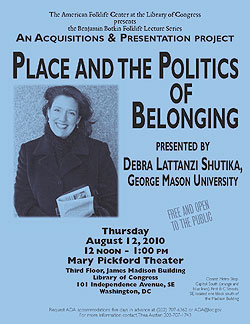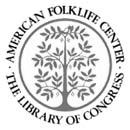| |
|||
|
|
The American Folklife Center at the Library of Congress August 12, 2010 Event Flyer Place and the Politics of BelongingPresented by Debra Lattanzi Shutika
One of America's greatest ironies is that, although a nation of immigrants, the country also has a longstanding history of ambivalence, and at times hostility, toward its newest arrivals. In the last decade, the increased number of immigrants living in new destinations, those settlements located outside the U.S.- Mexico borderlands, has coincided with an upsurge in local anti-immigrant sentiment. I began studying Latino immigration in 1995, which has allowed me to see firsthand the transformation of American sentiment regarding immigration and its effects on immigrant communities. Because of this, I have had the opportunity to consider the role of folklorists when the communities we study are in conflict. My work has largely focused on the transition of immigrants in new destinations in the mid-Atlantic region. During this time I have observed that while many migration scholars have worked to understand the lives and experiences of immigrants, few have seriously considered how immigration changes the lives of the native-born or long-term population. Considering the experiences and perspectives of the long-term population is important because often they have a significant influence on the lives of their immigrant neighbors, even in social contexts where the two groups rarely interact. Through my early work in Kennett Square, PA and more recently in Manassas, VA, I have realized that the issue of belonging is of central concern to immigrant residents and their longer-term neighbors. As immigrants from around the globe settle in new and diverse places, the question of belonging has become more central to the debate about how we live together. Belonging is a basic human need. It is the process through which people find recognition and comfort; it is often described as "feeling at home" around others where we work and play. There are many academic discussions that examine belonging and immigration, but these works tend to focus on issues such as multiculturalism, citizenship, and immigrant integration. I believe the question of belonging should be examined from the point of view of local citizens rather than from the top down (e.g., from the concerns of local leaders or government officials). I have found that the perspectives of elected officials are often too removed from the day-to-day neighborhood contexts where issues of belonging are central. It is precisely from within the local perspective that we can examine local attitudes about community change and consider how immigration affects local understandings of tradition, local history, and cultural norms. It is important to recognize that the most significant day-to-day aspects of life happen locally. A person's relationships with his or her next-door neighbors, for instance, are more likely to have an impact on daily life than the local government. In new destinations, issues of belonging are played out at this local level, and often become a twofold challenge. Local social contexts shift with the introduction of a new population making new destinations "new" for newcomers and longer-term residents alike. Immigrants are understandably struggling to belong, but the same can be true for residents who have lived their entire lives in what has become the new destination. In many instances, longer-term residents experience a type of localized displacement, a feeling that their "home" is no longer a familiar or predictable place. In some instances, longer-term residents react to the changes in their community with a sense of privilege. Because they were "here first," they assume that their residential longevity justifies local divisions of power and the subordination of more recent immigrant neighbors. These responses can have a tremendous influence on the lives of immigrants, but they are too often overlooked in debates about immigration. New destinations are communities in transition. Everyday life can be thrilling, but also exasperating, depending on a person's tolerance for change. Some long-term residents may see the introduction of an immigrant population as invigorating, but others may see the changes that are associated with immigration as damaging. For instance, when long-term residents believe they can no longer reliably expect that their neighbors will speak English or share the same cultural beliefs and community values, they may feel displaced. Long-term residents who feel displaced may find it difficult to embrace the changes taking place around them as their community transforms. In the most extreme cases, I have observed longer-term residents who find their changing communities threatening and frightening. This type of localized displacement is sometimes expressed through acts of intolerance and sometimes nativism. In some instances new destinations have become virtual battlegrounds where long-term residents insist that they must "take back" their communities. Many new destination communities have emerged in the U.S. in the last twenty years, but only a handful have had notably intolerant responses to immigrant settlement. While it is possible that communities might eventually work through the disruptions and change without intervention, in circumstances where the transition has been antagonistic or hostile there are ways to facilitate the transition in new destinations that are constructive and can foster community solidarity. As a folklorist I believe that strategic cultural documentation projects can be used to help communities with this process. Projects that foster a sense of belonging can help longtime residents accept and appreciate the community they have, which in turn can facilitate immigrant emplacement and belonging. Debra Lattanzi Shutika
|
| ||||


 The American Folklife Center was created by Congress in 1976 and placed at the Library of Congress to "preserve and present American Folklife" through programs of research, documentation, archival preservation, reference service, live performance, exhibition, public programs, and training. The Center includes the American Folklife Center Archive of folk culture, which was established in 1928 and is now one of the largest collections of ethnographic material from the United States and around the world.
The American Folklife Center was created by Congress in 1976 and placed at the Library of Congress to "preserve and present American Folklife" through programs of research, documentation, archival preservation, reference service, live performance, exhibition, public programs, and training. The Center includes the American Folklife Center Archive of folk culture, which was established in 1928 and is now one of the largest collections of ethnographic material from the United States and around the world.